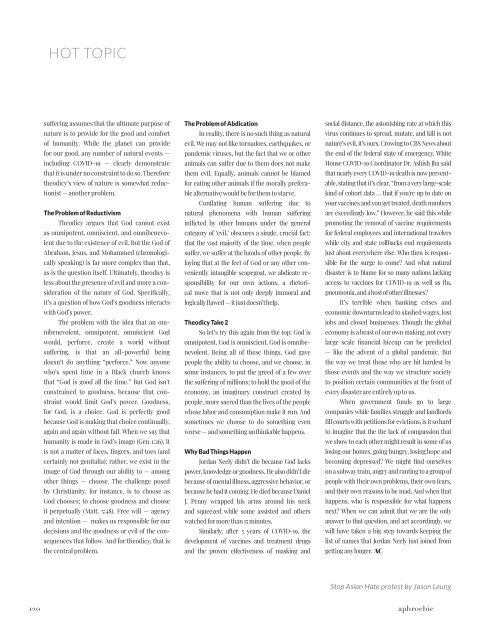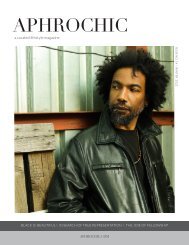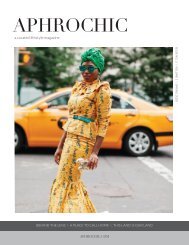AphroChic Magazine: Issue No. 12
You also want an ePaper? Increase the reach of your titles
YUMPU automatically turns print PDFs into web optimized ePapers that Google loves.
HOT TOPIC<br />
suffering assumes that the ultimate purpose of<br />
nature is to provide for the good and comfort<br />
of humanity. While the planet can provide<br />
for our good, any number of natural events —<br />
including COVID-19 — clearly demonstrate<br />
that it is under no constraint to do so. Therefore<br />
theodicy’s view of nature is somewhat reductionist<br />
— another problem.<br />
The Problem of Reductivism<br />
Theodicy argues that God cannot exist<br />
as omnipotent, omniscient, and omnibenevolent<br />
due to the existence of evil. But the God of<br />
Abraham, Jesus, and Mohammed (chronologically<br />
speaking) is far more complex than that,<br />
as is the question itself. Ultimately, theodicy is<br />
less about the presence of evil and more a consideration<br />
of the nature of God. Specifically,<br />
it’s a question of how God’s goodness interacts<br />
with God’s power.<br />
The problem with the idea that an omnibenevolent,<br />
omnipotent, omniscient God<br />
would, perforce, create a world without<br />
suffering, is that an all-powerful being<br />
doesn’t do anything “perforce.” <strong>No</strong>w anyone<br />
who’s spent time in a Black church knows<br />
that “God is good all the time.” But God isn’t<br />
constrained to goodness, because that constraint<br />
would limit God’s power. Goodness,<br />
for God, is a choice. God is perfectly good<br />
because God is making that choice continually,<br />
again and again without fail. When we say that<br />
humanity is made in God’s image (Gen 1:26), it<br />
is not a matter of faces, fingers, and toes (and<br />
certainly not genitalia); rather, we exist in the<br />
image of God through our ability to — among<br />
other things — choose. The challenge posed<br />
by Christianity, for instance, is to choose as<br />
God chooses; to choose goodness and choose<br />
it perpetually (Matt. 5:48). Free will — agency<br />
and intention — makes us responsible for our<br />
decisions and the goodness or evil of the consequences<br />
that follow. And for theodicy, that is<br />
the central problem.<br />
The Problem of Abdication<br />
In reality, there is no such thing as natural<br />
evil. We may not like tornadoes, earthquakes, or<br />
pandemic viruses, but the fact that we or other<br />
animals can suffer due to them does not make<br />
them evil. Equally, animals cannot be blamed<br />
for eating other animals if the morally preferable<br />
alternative would be for them to starve.<br />
Conflating human suffering due to<br />
natural phenomena with human suffering<br />
inflicted by other humans under the general<br />
category of ‘evil,’ obscures a single, crucial fact:<br />
that the vast majority of the time, when people<br />
suffer, we suffer at the hands of other people. By<br />
laying that at the feet of God or any other conveniently<br />
intangible scapegoat, we abdicate responsibility<br />
for our own actions, a rhetorical<br />
move that is not only deeply immoral and<br />
logically flawed — it just doesn’t help.<br />
Theodicy Take 2<br />
So let’s try this again from the top: God is<br />
omnipotent. God is omniscient. God is omnibenevolent.<br />
Being all of these things, God gave<br />
people the ability to choose, and we choose, in<br />
some instances, to put the greed of a few over<br />
the suffering of millions; to hold the good of the<br />
economy, an imaginary construct created by<br />
people, more sacred than the lives of the people<br />
whose labor and consumption make it run. And<br />
sometimes we choose to do something even<br />
worse — and something unthinkable happens.<br />
Why Bad Things Happen<br />
Jordan Neely didn’t die because God lacks<br />
power, knowledge or goodness. He also didn’t die<br />
because of mental illness, aggressive behavior, or<br />
because he had it coming. He died because Daniel<br />
J. Penny wrapped his arms around his neck<br />
and squeezed while some assisted and others<br />
watched for more than 15 minutes.<br />
Similarly, after 3 years of COVID-19, the<br />
development of vaccines and treatment drugs<br />
and the proven effectiveness of masking and<br />
social distance, the astonishing rate at which this<br />
virus continues to spread, mutate, and kill is not<br />
nature’s evil, it’s ours. Crowing to CBS News about<br />
the end of the federal state of emergency, White<br />
House COVID-19 Coordinator Dr. Ashish Jha said<br />
that nearly every COVID-19 death is now preventable,<br />
stating that it’s clear, “from a very large-scale<br />
kind of cohort data … that if you're up to date on<br />
your vaccines and you get treated, death numbers<br />
are exceedingly low.” However, he said this while<br />
promoting the removal of vaccine requirements<br />
for federal employees and international travelers<br />
while city and state rollbacks end requirements<br />
just about everywhere else. Who then is responsible<br />
for the surge to come? And what natural<br />
disaster is to blame for so many nations lacking<br />
access to vaccines for COVID-19 as well as flu,<br />
pneumonia, and a host of other illnesses?<br />
It’s terrible when banking crises and<br />
economic downturns lead to slashed wages, lost<br />
jobs and closed businesses. Though the global<br />
economy is a beast of our own making, not every<br />
large scale financial hiccup can be predicted<br />
— like the advent of a global pandemic. But<br />
the way we treat those who are hit hardest by<br />
those events and the way we structure society<br />
to position certain communities at the front of<br />
every disaster are entirely up to us.<br />
When government funds go to large<br />
companies while families struggle and landlords<br />
fill courts with petitions for evictions, is it so hard<br />
to imagine that the the lack of compassion that<br />
we show to each other might result in some of us<br />
losing our homes, going hungry, losing hope and<br />
becoming depressed? We might find ourselves<br />
on a subway train, angry and ranting to a group of<br />
people with their own problems, their own fears,<br />
and their own reasons to be mad. And when that<br />
happens, who is responsible for what happens<br />
next? When we can admit that we are the only<br />
answer to that question, and act accordingly, we<br />
will have taken a big step towards keeping the<br />
list of names that Jordan Neely just joined from<br />
getting any longer. AC<br />
Stop Asian Hate protest by Jason Leung<br />
<strong>12</strong>0 aphrochic

















